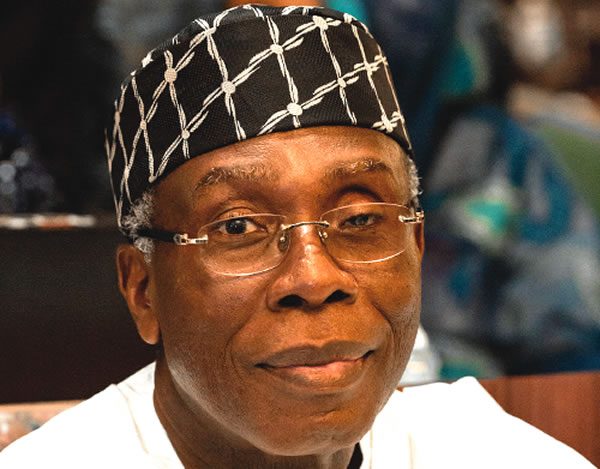Forgotten Dairies
Unfortunately, Audu Ogbeh May Be More Right Than Wrong -By Adebiyi Olusolape

The reason I refrained from sharing the Audu Ogbeh video when I first saw it some weeks ago was that the analysis was too simplistic for my liking. I did not need a crystal ball to predict that it would only be a matter of time before someone would come along to criticise the honourable minister’s presentation with an argument pitched at a more rigorous level, which, among many others, is what has happened with an article titled, “You Got It All Wrong, Audu Ogbeh” by Jekwu Ozoemene.
Also, while the anecdotal example of pizza being ordered from abroad, which Ogbeh used, rings true and exercises the popular imagination, it belongs among the more lightweight symptoms of the relevant structural issues that Nigeria is striving to solve.
Nevertheless, the reasons why I did not comment on the video of Ogbeh anywhere, until now, are that the following are true:

1. Devaluation is a destruction of wealth and ultimately leads to the immiseration of the populace. That consequence would equally be true of depreciation, which is the equivalent of devaluation that would ensue under a floating exchange rate regime, something that many of the detractors of Ogbeh recommend as an alternative.
2. The influence wielded and the pressure brought to bear by the empty suits who pushed to the so-called ‘Washington Consensus’ is nothing to sneeze at. The issue is subversion of sovereignty. Wrongheaded prescriptions for Nigeria do not always have to be backed by coercion for them to have a deleterious effect.
3. Within the context of the overall point Ogbeh was making – that of the ongoing efforts to diversify exports, reduce the leakages from the Nigerian economy’s circular flow, thereby conserving aggregate demand – it is actually possible, in good faith, to overlook some of his rhetorical tics, but that is a subjective matter. I give him the benefit of the doubt – others in the audience should not be compelled to do likewise.
I would like to point out that Ozoemene’s article makes two points that actually support Ogbeh’s larger position, and if Ogbeh had tried to limit his claims to those facts adduced by Ozoemene, as well as other facts beyond them, he would have presented a smaller target to his detractors. Let me point out here that the video clip whose content is being debated may or may not be representative of Ogbeh’s entire presentation. In any case, permit me to quote from Ozoemene’s article in singling out the facts that support what I take to be Ogbeh’s larger point in the said video:
1. “The economic model for Nigeria’s REER is slightly different from most due to two major characteristics of our economy; our foreign exchange controls and the fact that crude oil is the dominant export product and the country’s major source of Foreign Exchange….Now, defending the Naira/Exchange rate is required because given the extant fundamentals (from a demand and supply premise), not to do so will lead to uncontrolled devaluation as government is currently the largest generator of FX in our economy.”
2. “The good news
To my mind, a defence of Ogbeh would have to be mounted on those two concessions by Ozoemene. However, that is not all. There is a third body of facts to consider. The numbers published by the National Bureau of Statistics in the Foreign Trade in Goods Statistics (Q4 2018) and the Selected Banking Sector Data (Q4 2018) reports tell a story in its very early stages of development but a story that is positive, nonetheless.
While the latest numbers show that petroleum still dominates exports and government revenues, under the administration in which Ogbeh serves:
1. The share of bank lending to manufacturing is growing again;
2. Inflation continues to fall;
3. Some sections of the commentariat have recently become fond of
comparing the administration in which Ogbeh serves to the administration
of Donald Trump, but Nigeria is in trade surplus while the US is in
deficit: Nigeria’s imports have fallen again, while its exports keep
rising;
4. Petroleum’s share of overall exports is reducing, slowly, but reducing nonetheless;
5. Agriculture’s share of overall exports is growing exponentially;
6. Manufacturing’s share of overall exports is growing moderately;
7. On the import side, import of capital goods is the largest share,
which ought to be good news, even though much of it is motor cycles
(good for temporarily mitigating the overall unemployment, as well as
youth unemployment problems). The other counters in the import of
capital goods bag are gas turbine parts (good for power generation),
telecommunications equipment (good for the services sector), and
agro-processing equipment (good for value addition to the outputs of
primary industry).
8. Import of raw materials is growing, more good news for manufacturing and value addition;
9. Import of manufactured goods is falling (good for domestic aggregate demand as that means less leakage).
That is, although it is all work in progress and certainly nowhere near complete, when Ozoemene says, ‘mainly due to our lack of discipline to implement much required fiscal policy reforms as well as our tendency to think that monetary policy interventions can replace fiscal reforms’, it would be important to concede that the administration in which Ogbeh serves is the one with the greatest amount of discipline, since the oil boom of the 1970s, to go the farthest towards implementing the kind of fiscal reforms we need. Of course, they necessarily stand on the shoulders of every positive, sustained and giant achievement of the administrations that came before. Separating all the various strands, good and bad, is usually only motivated by partisan goals and only possible through analytical artifices. It is important to acknowledge that there have been serious attempts to implement fiscal reforms in Nigeria since the 1970s or, even more pertinently, since 1999.
Nevertheless, there seems to be a careful distinction that is worth making between what came before it and what the administration in which Ogbeh serves seems to be trying to achieve. To draw out the point of the differences in fiscal and monetary policy goals between the administration in which Ogbeh serves and the administrations that came before it, it might be useful to consider the Nigerian banking industry. The poster child for institutional reform and growth in Nigeria before the current administration entered office would arguably be the banking industry. Okonjo-Iweala, Soludo, Sanusi – it has been a critical industry in which reforms have borne the imprints of some of the most celebrated technocrats in recent Nigerian history.
However, whatever progress was made before 2015, if banking is meant to be a driver of investment through lending, the fact that such a great share of bank lending went (and still goes) to the petroleum industry is evidence that, in one sense, all the growth we have rejoiced in since 2003 is driven by the oil-dependent non-oil sector and directly by the oil sector. That is, the lion share of growth witnessed in the banking industry continued to be driven by petroleum, in spite of all the reforms since 2003.
Considering Nigeria through the lens of its GDP, the oil sector is only 9
Therefore, it only stands to reason that any set of fiscal and monetary policies that is guided by the current administration’s Economic Recovery and Growth Plan (ERGP) – which takes as its aim the growth of the oil-free subsector, increasing its 39 per cent share, and the contraction of the oil-dependent subsector, decreasing its 52 per cent share – will definitely look anti-business and anti-growth. However, is a slowdown necessary if Nigeria needs to stop traveling quickly in the wrong direction of oil-dependent growth, paradoxically in its non-oil subsector?
In certain sections of the commentariat, it is now quite fashionable to claim that the administration in which Ogbeh serves has no economic plan or employs no technocrats. Such claims are false. We should all read the ERGP and criticise that. Is it important for Nigeria to diversify government revenues and exports away from petroleum? How best should that be done? Those are important questions. Arguments that ignore those questions are a little less than worthless in my view.
One other thing that is now all the rage is to keep screaming ‘growth, growth, growth’, at the administration in which Ogbeh serves. One would have thought that with the period of time that has elapsed since Arthur Lewis and Amartya Sen won their Nobel prizes (an indication that Development Economics has been accepted into the mainstream of economic and policy thought), everyone by now accepts that for a country at Nigeria’s stage of development, a rhetoric that exclusively focuses on growth would be insidious.
However, that is not all there is to say about the obsession with growth that is now popular in certain sections of the commentariat. There is always a distinction to be made between good growth and bad growth. Even economists with an obsessive faith in growth, especially those influenced by the monetarists, argued that if growth is driven by the wrong fundamentals, it would be important, more or less, to induce a recession so that the economy could be cured of its fundamental maladies. Historically, the challenge that prompted such distinctions between good growth and bad growth in the by-growth-alone camp was stagflation. In any case, what method may be discernible in the madness of the administration in which Ogbeh serves is a concerted effort to dial back the kind of growth driven by the oil-dependent non-oil subsector and the oil sector, in favour of growth driven by the oil-free non-oil subsector, a goal balanced on the knife edge of tradeoffs.
Finally, some of the change Nigeria needs can only come from the private sector – it cannot be done by government alone. Although our private sector is resourceful and resilient in some respects, its larger, informal subsector is more often than not technically backward with low productivity and low output. Again, its formal subsector has a low capacity and poor track record in channeling investments to research and development (R&D). That formal subsector’s services and goods are mainly middling to poor. Its operations are inefficient. The financing function in that formal subsector is treated as one to enrich owners and management, at the expense of other employees and the firm. The claim that all that is due to government policy and down to government to fix is a fig leaf. In this connection, compare Nigeria’s capital markets to our money markets. The latest disparities in the flow of investments could be taken to indicate, in one sense, that investors have more faith in the administration in which Ogbeh serves than in the Nigerian private sector.
Therefore, Ozoemene’s view that, ‘The problem is that (Government) does not create a conducive environment for Nigerian businesses to thrive, produce, compete effectively with businesses outside the country to export and earn FX’, is one of the half-truths we have been telling ourselves in order to keep absolving the Nigerian private sector of failing spectacularly in its role of partnering government to lift Nigeria to the heights of sustainable development.
Adebiyi Olusolape is a social entrepreneur and co-founder of Black Swan Tech Ltd.



















